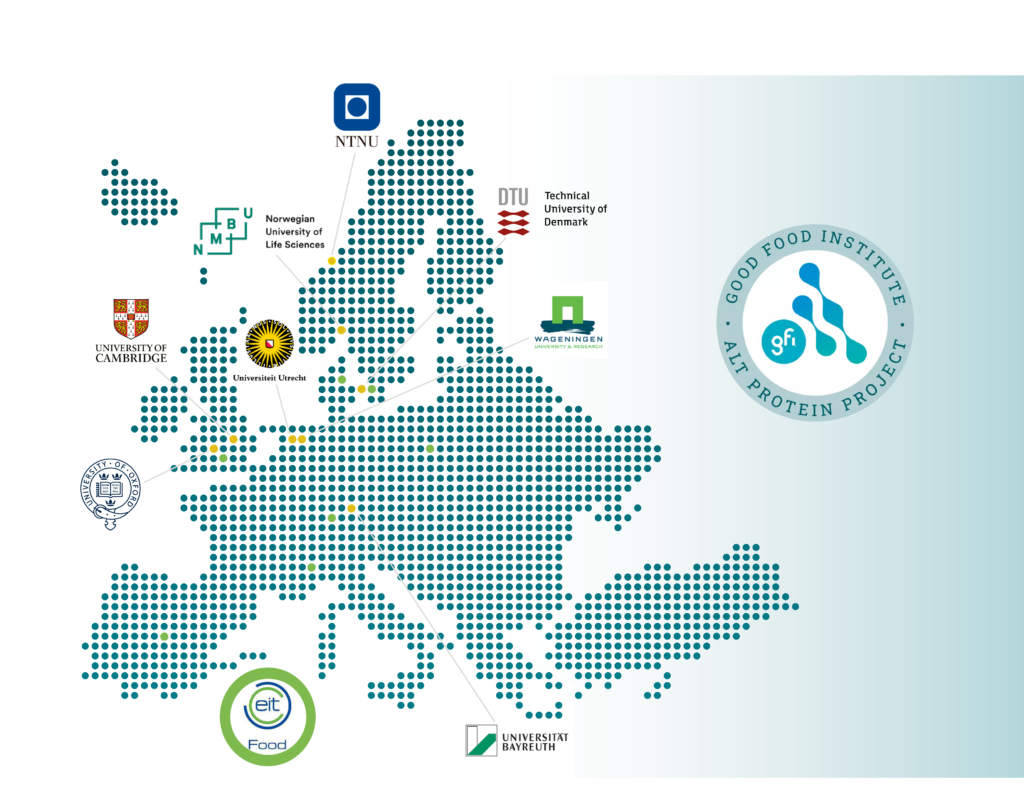Forschung zu alternativen Proteinen
Kultiviertes Fleisch und Lebensmittel auf Basis von Pflanzen und Fermentation bieten spannende Forschungsmöglichkeiten mit erheblichem gesellschaftlichen Nutzen.
Als internationale Nichtregierungsorganisation arbeitet das Good Food Institute Europe mit Forschenden zusammen, um Open-Access-Forschung zu alternativen Proteinen voranzubringen und zu finanzieren.


GFIs Online-Kurs
Der frei zugängliche Online-Kurs von GFI macht die Wissenschaft hinter alternativen Proteinen erlebbar. In fünf Modulen zum Selbststudium werden Sie in die technischen Verfahren zur Herstellung von Fleisch auf Basis von Pflanzen, Kultivierung und Fermentation eingeführt und lernen viel über die ökologischen und wirtschaftlichen Aspekte dieser Bereiche. Der Kurs ist auf English.
Kurse zu alternativen Proteinen
Europäische Research-Community
Eine wachsende Gemeinschaft von Forschenden aus verschiedenen Fachbereichen widmet sich dem Thema alternative Proteinquellen. In einem Artikel in der Nature Biotech legen wir dar, warum dies ein faszinierendes Forschungsgebiet ist und welche Möglichkeiten Forschende haben, um in diesen Bereich einzusteigen.
Forschende zu alternativen Proteinen
Nutzen Sie dieses Verzeichnis, um mit Forschenden aus Europa in Kontakt zu treten, die bereits im Bereich alternative Proteine tätig sind oder ihr Fachwissen auf diesem Gebiet anwenden möchten. Das Verzeichnis zeigt, auf welche Art die Forschenden mit Studierenden, Labors und Unternehmen zusammenarbeiten wollen.
Datenbank mit Laboren
Nutzen Sie diese Datenbank, um sich über Labore zur Forschung an alternativen Proteinquellen in ganz Europa zu informieren. Die Labore sind nach Proteinkategorie und Forschungsschwerpunkten kategorisiert.

Veranstaltungen
Das Wissenschafts- und Technologie-Team von GFI veranstaltet regelmäßig Webinare und Networking-Veranstaltungen, bei denen Sie sich über die neuesten Forschungsergebnisse informieren und sich mit anderen Forschenden vernetzen können.
Die studentische Initiative The Alt Protein Project
Das Alt Protein Project ist eine globale studentische Initiative, die sich zum Ziel gesetzt hat, Universitäten zu Motoren für die Ausbildung, Forschung und Innovation im Bereich alternativer Proteinquellen zu machen. Studierende sind die treibende Kraft hinter dem Alt Protein Project, das an Universitäten auf der ganzen Welt immer mehr an Fahrt gewinnt.

Europäische APP Chapters
Universät Bayreuth
Das Alt-Protein-Project an der Universität Bayreuth-Kulmbach verbindet Forschung und Lehre zum Thema alternative Proteine an der Schnittstelle zwischen Natur- und Sozialwissenschaften. Das Projekt bringt Forschende und Studierende zusammen, die auf eine nachhaltige und gerechte Zukunft hinarbeiten, in der alternative Proteine eine herausragende Rolle spielen.
Als eine führende Universität mit einer neu eingerichteten Fakultät für Lebensmittel, Ernährung und Gesundheit verfügt die Universität Bayreuth über Spitzenforschende, ein hochmodernes Forschungs- und Lehrumfeld und die Motivation, das globale Ernährungssystem zu verbessern.
EIT Food (Engl.)
The EIT Food Alt Protein Project’s mission is to build a future-fit food system that produces healthy and sustainable food for all by raising awareness and generating interest in sustainable proteins.
The EIT Food is the world’s largest and most dynamic food innovation community that creates connections across the food system to stimulate new ideas and innovations.
This APP chapter is hosted by a pan-European community consisting of seven universities. These include the Autonomous University of Madrid, Lund University, University of Warsaw, University of Reading, University of Turin, University of Hohenheim and Aarhus University.
This diverse range of academic institutions enables the group to engage an equally diverse range of students, scientists, staff and other stakeholders. Bringing together the individual strengths of all partners from our network, they will focus on expanding sustainable protein research and education opportunities, while building a passionate student society across Europe.
Technical University of Denmark (Engl.)
The DTU Alt Protein Project is building a unique community of experts and enthusiasts in the sustainable protein field. It educates, raises awareness, empowers research and provides networking opportunities to those passionate about sustainable proteins.
Norwegian University of Life Sciences (Engl.)
The NMBU Alt Protein Project aims to build a healthy, sustainable and just food system by creating a thriving community for education, research, and innovation in sustainable proteins. They are a welcoming space for everyone eager to co-create the future of food – for people, animals, and the planet.
The Norwegian University of Life Sciences (NMBU) lies at the heart of food and agriculture in Norway, and is a world-leading university in sustainability, agriculture, food, and life sciences. From this hub, the Project seeks to steward the Norwegian and Nordic ecosystem of sustainable proteins. Their aim is to build trans-disciplinary capacity and collaboration that bridges academia and industry, and connects research, innovation and markets.
Together with GFI and other collaborators, they work to enable an inclusive win-win transition from industrial animal production towards sustainable proteins. They focus on three main objectives:
1. Build a fun, fulfilling, and inclusive community at NMBU, organising and attending events to generate awareness and excitement about sustainable proteins. This includes meet-ups, seminars, product tastings, facility tours, excursions, and more.
2. Create and support sustainable protein courses, tracks, programmes, and other education to facilitate student engagement and build a passionate workforce for the booming industry.
3. Catalyse innovation and entrepreneurship through an innovation platform on campus (Food Lab), workshops, student challenges, and collaboration with industry and incubators.
Norwegian University of Science and Technology (Engl.)
The NTNU Alt Protein Project hopes to recruit students in relevant fields who may be swayed to do work beneficial to sustainable protein innovation. The Project’s main objective is to increase the presence and awareness of sustainable protein knowledge among the students.
To start off, they will run a sustainable protein course, help students connect with sustainable protein companies and organisations, and invite people relevant to the sustainble protein sector to talk to students. The group has already established and will continue to maintain a connection to other Nordic alt protein groups.
University of Oxford (Engl.)
The Oxford Alt Protein Project was founded to connect Oxford’s research expertise with ambitious young minds, propelling innovation, research, and education of sustainable proteins within the community.
Through seminars and discussions with industry experts and NGOs, the Project aims to stimulate discussions and interest from researchers, administrators, and students, establishing Oxford as one of the centres for sustainable proteins.
University of Cambridge (Engl.)
The Cambridge Alt Protein Project aims to create a sustainable protein ecosystem in Cambridge and build the groundwork for open-access research in the sustainable protein industry.
To achieve this, they are raising awareness of sustainable proteins in the Cambridge community and establishing a pipeline for talented students to enter the field. They are proud to have built and run the world’s largest sustainable protein educational and talent recruitment programme, which has resulted in the formation of a number of new student groups, sparked research projects and connected multiple talented students with career opportunities.
Utrecht University (Engl.)
The Utrecht Alt Protein Project strives to enable a sustainable and animal-free food supply by creating an impactful research and development hub on alternative proteins.
Utrecht University has a very strong and broad base in life sciences, as well as biophysics and social science. Additionally, the university has a strong sustainability agenda, and food related research and innovation initiatives such as Future Food Utrecht. The university is also in close contact with the Dutch technical research institute TNO, which has historically done impactful research on sustainable proteins.
The Utrecht APP is working to translate this into a central mission statement on sustainable proteins.
Wageningen University and Research (Engl.)
Wageningen University is already an established cornerstone of the Food Research Industry. As a student group, the Wageningen Alt Protein Project’s mission is to help other fellow students to learn more about the amazing opportunities in this field, by providing resources regarding sustainable proteins of all kinds.
The group collaborate with companies to provide insights in the current problems and developments, job opportunities and internships, educational information about the current state of research, and online content such as webinars and podcasts for people to use.
Informationen für Lehrkräfte und Studierende



Team für Wissenschaft und Technologie
Forschungsfinanzierung
Nutzen Sie die unten stehenden Datenbanken, um Möglichkeiten der Forschungsförderung in ganz Europa zu finden. GFI Europe kann Forschende bei der Beantragung von Fördermitteln unterstützen. Wenn Sie in Europa ansässig sind, wenden Sie sich bitte an unsere Research and Grants Managerin Stella Child, um zu erfahren, wie wir Sie unterstützen können.
Datenbank zur Forschungsförderung
Die GFI-Datenbank zur Forschungsförderung führt Möglichkeiten zur Förderung von Open-Access-Forschung zu alternativen Proteinen auf. Erfahren Sie in diesem 2-Minuten-Tutorial (Engl.), wie Sie die Datenbank nutzen können.
Research Grants Tracker von GFI
Entdecken Sie unseren Tracker für Forschungszuschüsse im Bereich alternative Proteine. Das Verzeichnis bietet Einblicke in die Open-Access-Forschung in Europa, einschließlich Informationen dazu, was finanziert wird, wer es finanziert und in welcher Höhe.

Research Grant Programm
Unser Förderprogramm wird durch die großzügigen Spenden unserer Unterstützer:innen finanziert und dient der Förderung von Open-Access-Forschung im Bereich alternative Proteine. Informieren Sie sich über die von uns geförderten Projekte und finden Sie Finanzierungsmöglichkeiten für Ihre eigenen Forschungsprojekte.
Informationen für Forschende

GFIs Advancing Solutions Datenbank
Die GFI-Datenbank Advancing Solutions for Alternative Proteins (ASAP) enthält Forschungslücken, kommerzielle White Spaces, technologischen Entwicklungsbedarf und Investitionsprioritäten entlang der Wertschöpfungskette für alternative Proteinquellen.
Analysen und frei zugängliche Datenbanken von GFI

Smart Protein Project
GFI ist Teil dieser von der Europäischen Kommission finanzierten Partnerschaft zwischen 31 Organisationen aus 21 Ländern. Ziel des Smart Protein Projects ist es, pflanzenbasierte Lebensmittel in Europa voranzubringen.



























